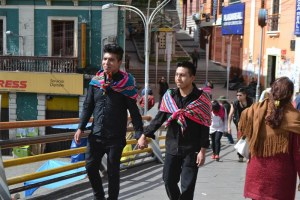Activists Pushing Ahead to Raise Awareness of Gay Culture in Bolivia
May 13, 2018 - LatinAmerin Herald Tribune
LA PAZ – "Dark-skinned, poor and queer" is how Edgar Solis – a member of the Maricas Bolivia (Bolivia Queers) movement – defines himself, a lawbreaker at times but a tenacious defender of free love in a country where gays experience at times severe discrimination because of their sexual orientation.
 Along with Roberto Condori, Solis is fighting to create "an alternative discourse" in Bolivia, where the gay culture "has become stereotyped."
Along with Roberto Condori, Solis is fighting to create "an alternative discourse" in Bolivia, where the gay culture "has become stereotyped."
"We question the word gay a lot as a stereotype, for which we want to substitute the word 'marica' (queer) as a redesignation of that insult, but also because we need to create an alternative discourse to this gay institutionality that has suddenly come to Bolivia," Solis told EFE.
A few days ago, activists made their concerns known at the Cultural Center of Spain in La Paz.
Since 2011, what began as a radio program has transformed itself into Maricas Bolivia, a movement that defends the rights of homosexuals and seeks to have society acknowledge and accept this reality via artistic events that mix culture with free love.
"Gay in Bolivia, in Latin America and in the world is a sanitized society. There are no fat people, old people, mixed-race people in gay ... Gay is a more hygienic entity, whiter, in fact," he said.
That is why Solis defines himself as "dark-skinned" (cholo), a label with pejorative connotations that refers to indigenous Bolivians who have come into the cities from the country's rural areas.
Solis and Condori both support gender and sex education to improve the situation of gays.
"If we educate and raise kids where they talk about these issues, then (new) generations can have another level of openness in their thinking," Solis said.
The Network of Lesbian and Bisexual Women also supports more education and for LGTBI issues to be woven into academic discourse.
Wendy Molina, representing the group, presented the magazine Desafio (Challenge), with content directed at lesbians and transsexuals, at the same event at the Cultural Center of Spain.
"In a country where they're killing us on the streets, our commitment is to fight to become visible" and promote awareness, she said.
The Bolivian Ombudsman's Office reported in 2017 that over the past decade 64 members of the LGBTI community were murdered in Bolivia, with only 14 of those crimes actually investigated by police and nobody being found guilty.